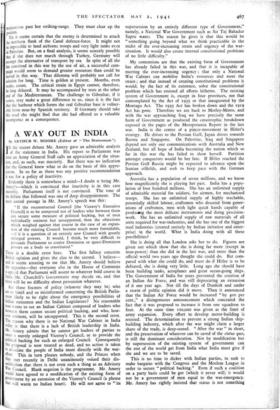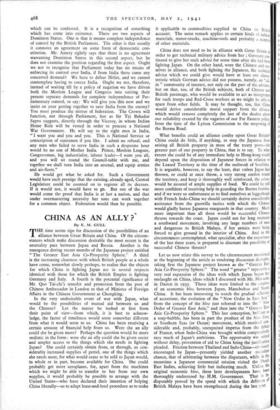A WAY OUT IN INDIA
fly ARTHUR W. MOORE (Editor of " The Statesman ") 1 the recent debate Mr. Amery gave an admirable analysis of the stalemate in India. His report to Parliament was what an Army General Staff calls an appreciation of the situa- tion, and, as such, was masterly. But there was no indication that the General knew what to do on the basis of this appre- ciation. In so far as there was any positive recommendation it was for a policy of inactivity.
Evidently there is somewhere a mind—I doubt it being Mr. Amery's—which is convinced that inactivity is in this case masterly. Parliament itself is not convinced. The tone of the debate that followed was one of deep disappointment. The most unreal passage in Mr. Amery's speech was this: " If the reconstructed Council [the Viceroy's Executive Council] is to be composed not of leaders who between them can secure some measure of political backing, but of men individually eminent but unsupported, then the objections which weighed against that course in the case of an expan- sion of the existing Council become much more formidable, —if it is a question of an entirely new Council with greatly enlarged powers. It would, I think, be very difficult to persuade Parliament to confer Dominion or quasi-Dominion powers on a body so constituted."
There is a double error here. The first fallacy concerns British opinion and gives the clue to the second. I believe— and it seems amazing to me that Mr. Amery should believe the opposite—that everyone else in the House of Commons is agr;i2d that Parliament will assent to whatever bold course in India :■dr. Churchill's Government may decide on, and that there will be no difficulty about persuasion whatever.
Are those framers of policy (whoever they may be) who are so timid and so misinformed concerning the British Parlia- ment likely to be right about the emergency possibilities of Indian statesmen and the Indian Legislature? No reasonable man wants to see an Indian Cabinet composed of leaders who between them cannot secure political backing, and who, how- ever eminent, will be unsupported. This is the second error. The reason why there is no National War Cabinet in India today is that there is a lack of British leadership in India. Mr. Amery admits that he cannot get leaders of parties to enter a merely enlarged Viceroy's Council, or to provide the Political backing for such an enlarged Council. Consequently tills proposal is now treated as dead, and no action is taken to associate the people of India more directly with the war- effort. This in turn pleases nobody, and the Princes when they met recently in Delhi unanimously voiced their dis- satisfaction that there is not even such a thing as an Advisory Tar Council. Blank negation is the programme. Mr. Amery Would have agreed to a modification of the existing form of government by an extension of the Viceroy's Council (a phrase that will warm no Indian heart). He will not agree to " its supersession by an entirely different type of Government," namely, a National War Government such as Sir Tej Bahadur Sapru wants. The reason he gives is that this would be " something going beyond what we think practicable in the midst of the ever-increasing strain and urgency of the war- situation. It would also create internal constitutional problems of no little difficulty."
My contentions are that the existing form of Government has already failed in this war, and that it is incapable of meeting the ever-increasing urgency ; that only a National War Cabinet can mobilise India's resources and meet the strain ; and that instead of creating constitutional problems it would, by the fact of its existence, solve the constitutional problem which has resisted all efforts hitherto. The existing system of Government is, except in four provinces, not that contemplated by the Act of 1935 or that inaugurated by the Montagu Act. The 1935 Act has broken down and the 1979 Act has gone. Therefore we are back to Morley-Minto, and with the war approaching Iraq we have precisely the same form of Government as produced the catastrophic breakdown exposed in the pages of the Mesopotamia Report in the last war. India is the centre of a pincer-movement in Hitler's strategy. He drives to the Persian Gulf, Japan drives towards Burma and Singapore. On Palestine, Iraq and Singapore depend not only our communications with Australia and New Zealand, but all hope of India becoming the nation which so far in this war she has failed to show herself. Partition amongst conquerors would be her fate. If Hitler reached the Persian Gulf Russia might be expected to advance upon the Iranian oilfields, and seek to keep pace with the German approach.
Australia has a population of seven millions, and we know how magnificently she is playing her part. India has a popu- lation of four hundred millions. She has an unlimited supply of admirable material for soldiers, for airmen, for mechanised troops. She has an unlimited supply of highly teachable, potentially skilled labour, craftsmen who descend from gener- ations of craftsmen, men with light quick hands capable of producing the most delicate instruments and doing precision- work. She has an unlimited supply of raw materials of all sorts required for war-industries, and she has one of the biggest steel industries (created entirely by Indian initiative and enter- prise) in the world. What is India doing with all these possibilities?
She is doing all that London asks her to do. Figures are given out which show that she is doing far more (except in man-power) than she did in the last war, and more than the official world two years ago thought she could do. But com- pared with what she could do, and must do if Hitler is to be defeated, she is doing very little. Long ago she should have been building tanks, aeroplanes and great ocean-going ships. The Government of India for years prevented the creation of an Indian Air Force, and was still deprecating an extension of it one year ago. Not till the days of Dunkirk and under a storm of public opinion did it move. Then it announced that the Indian Air Force would be increased " by 40o per cent.," a disingenuous announcement which concealed the fact that it was proposed to increase it from one squadron to four. At the same time ioo,000 was given as the limit of army expansion. Every effort to develop motor-building is resisted. The determination to prevent a strong Indian ship- building industry, which after the war might claim a larger share of the trade, is deep-seated. " After the war " in short, and the preservation of whatever can be saved of the status quo, is still the dominant consideration. Not by modification but by supersession of the existing system of government can the rest of the world get from India what India must give if she and we are to be saved.
This is no time to dicker with Indian parties, to seek to make bargains with the Congress and the Moslem League in order to secure " political backing." Even if such a coalition on a party basis could be got (which it never will) it would not be a government of men equal to the war-emergency. Mr. Amery has rightly insisted that status is not something which can be conferred. It is a recognition of something which has come into existence. There are two aspects of Dominion Status. One is that it means complete independence of control by the British Parliament. The other is that usually it connotes an agreement on some form of democratic con- stitution. Mr. Amery rightly says that there is no agreement warranting Dominion Status in this second aspect, but he does not examine the position regarding the first aspect. Ought we not to recognise that Parliament today has no means of enforcing its control over India, if from India there came any concerted demand? We have to defeat Hitler, and we cannot contemplate having to coerce India. Ought we not, therefore, instead of waiting till by a policy of negation we have driven both the Moslem League and Congress into uniting their present separate demands for complete independence of Par- liamentary control, to say: We will give you this now and we insist on your getting together to save India from the enemy? You must produce the mirror of federation. The Crown will function, not through Parliament, but as Sir Tej Bahadur Sapru suggests, directly through the Viceroy, in whom Indian Home Rule will be vested in order to procure a National War Government. He will say to the right men in India, " I want you and you and you. This is National Service or conscription of statesmen if you like. I admit no refusal, and any man who failed to serve India in such a desperate hour would be no son of Mother India. Prince, Moslem Leaguer, Congressman, big industrialist, labour leader—I want you all, and you will sit round the Council-table with me, and together we shall turn India into an arsenal, and equip armies and air-fleets."
He would get what he asked for. Such a Government would have such prestige that the existing, already aged, Central Legislature could be counted on to register all its decrees. If it would not, it would have to gb. But out of the war would come the proof that India is at last a nation, and that under overmastering necessity her sons can work together for a common object. Federation would then be possible.































 Previous page
Previous page